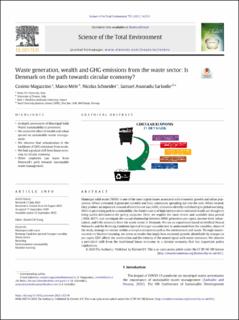| dc.contributor.author | Magazzino, Cosimo | |
| dc.contributor.author | Mele, Marco | |
| dc.contributor.author | Nicolas, Schneider | |
| dc.contributor.author | Sarkodie, Samuel Asumadu | |
| dc.date.accessioned | 2021-02-15T15:03:44Z | |
| dc.date.available | 2021-02-15T15:03:44Z | |
| dc.date.created | 2020-10-05T14:12:39Z | |
| dc.date.issued | 2021 | |
| dc.identifier.citation | Magazzino, C., Mele, M., Schneider, N. & Sarkodie, S. A. (2020). Waste generation, wealth and GHG emissions from the waste sector: Is Denmark on the path towards circular economy? Science of the Total Environment, 755: 142510. doi: | en_US |
| dc.identifier.issn | 1879-1026 | |
| dc.identifier.uri | https://hdl.handle.net/11250/2728197 | |
| dc.description.abstract | Municipal solid waste (MSW) is one of the most urgent issues associated with economic growth and urban population. When untreated, it generates harmful and toxic substances spreading out into the soils. When treated, they produce an important amount of Greenhouse Gas (GHG) emissions directly contributing to global warming. With its promising path to sustainability, the Danish case is of high interest since estimated results are thought to bring useful information for policy purposes. Here, we exploit the most recent and available data period (1994–2017) and investigate the causal relationship between MSW generation per capita, income level, urbanization, and GHG emissions from the waste sector in Denmark. We use an experiment based on Artificial Neural Networks and the Breitung-Candelon Spectral Granger-causality test to understand how the variables, object of the study, manage to interact within a complex ecosystem such as the environment and waste. Through numerous tests in Machine Learning, we arrive at results that imply how economic growth, identifiable by changes in per capita GDP, affects the acceleration and the velocity of the neural signal with waste emissions. We observe a periodical shift from the traditional linear economy to a circular economy that has important policy implications. | en_US |
| dc.language.iso | eng | en_US |
| dc.publisher | Elsevier | en_US |
| dc.rights | Attribution-NonCommercial-NoDerivatives 4.0 Internasjonal | * |
| dc.rights.uri | http://creativecommons.org/licenses/by-nc-nd/4.0/deed.no | * |
| dc.title | Waste generation, wealth and GHG emissions from the waste sector : Is Denmark on the path towards circular economy? | en_US |
| dc.type | Peer reviewed | en_US |
| dc.type | Journal article | en_US |
| dc.description.version | publishedVersion | en_US |
| dc.rights.holder | © 2020 The Author(s) | en_US |
| dc.subject.nsi | VDP::Samfunnsvitenskap: 200 | en_US |
| dc.source.pagenumber | 15 | en_US |
| dc.source.volume | 755 | en_US |
| dc.source.journal | Science of the Total Environment | en_US |
| dc.identifier.doi | 10.1016/j.scitotenv.2020.142510 | |
| dc.identifier.cristin | 1837130 | |
| dc.description.localcode | Unit Licence Agreement | en_US |
| dc.source.articlenumber | 142510 | en_US |

